7+ SAMPLE Marketing Campaign
-
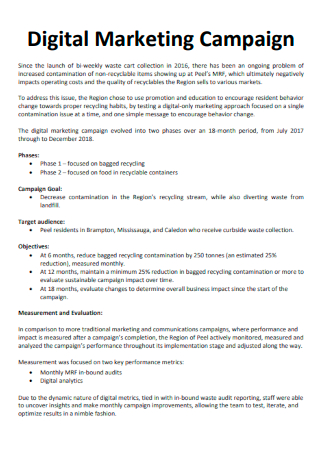
Digital Marketing Campaign
download now -
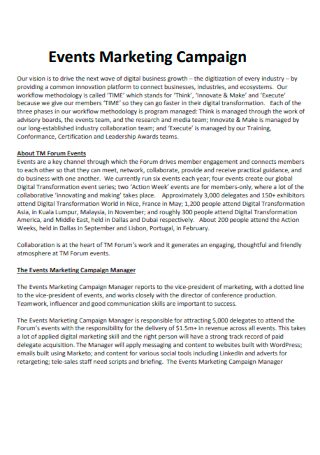
Events Marketing Campaign
download now -
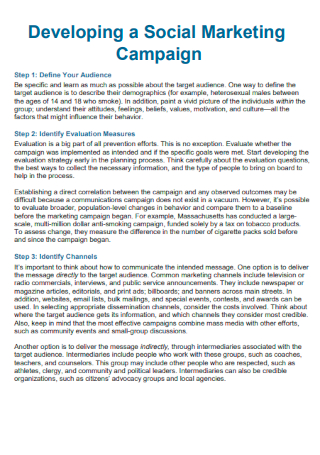
Developing a Social Marketing Campaign
download now -
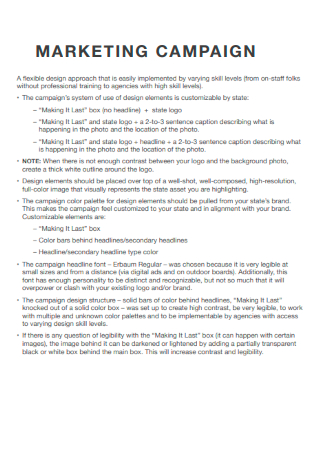
Sample Marketing Campaign
download now -
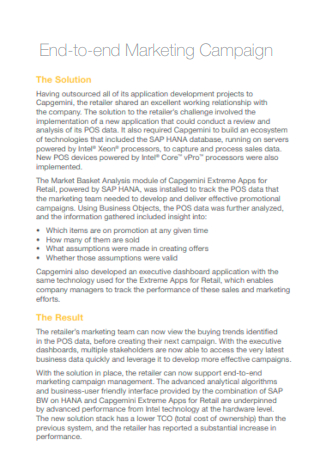
End-to-End Marketing Campaign
download now -
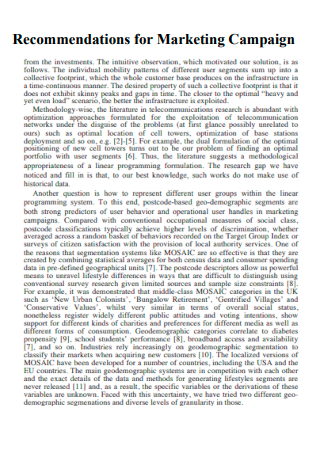
Recommendations for Marketing Campaign
download now -
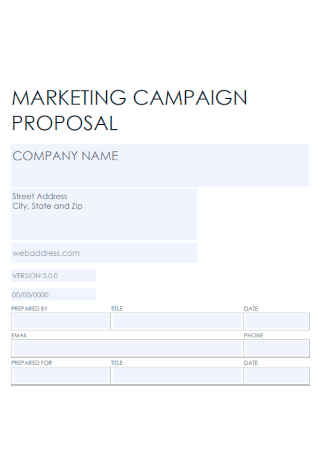
Marketing Campaign Proposal
download now -
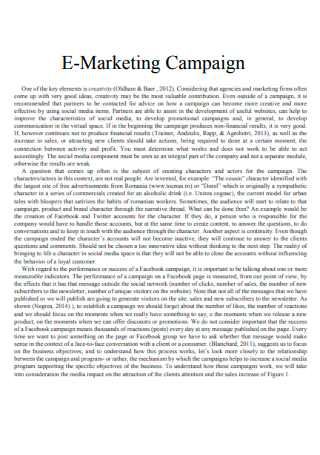
E Marketing Campaign
download now
FREE Marketing Campaign s to Download
7+ SAMPLE Marketing Campaign
What Is a Marketing Campaign?
Benefits of Business Marketing
Types of Marketing Campaigns
How To Develop a Winning Marketing Campaign
FAQs
What makes a successful cause marketing campaign?
What is the reason for a campaign?
What is the goal of social marketing?
What Is a Marketing Campaign?
A marketing campaign is a process of promoting a product or service using various media. These media include traditional resources such as television, radio, print media, and, more recently, the Internet. Nearly all firms are dependent on marketing campaigns to inform consumers about their products and services. As a result, a considerable amount of help is allocated to developing marketing campaigns. Statistics indicate that only 58 percent of marketers say they frequently achieve their marketing objectives.
Benefits of Business Marketing
As a business owner, it is required to implement the appropriate systems. Without them, how can your firm function or hope to survive? In addition to accounting, human resources systems, and others, marketing is now acknowledged as an integral component of a company’s significant systems. It has taken many years, but marketing is now more crucial than ever. Why? As you establish your brand, increase your visibility among varied audiences, and gain a competitive edge over the competition, the marketing benefits will become apparent. Without question, every firm should be aware of the advantages of marketing and the types of marketing methods that will aid in acquiring loyal customers. Here are six benefits of implementing a marketing strategy:
Types of Marketing Campaigns
A marketing campaign is a strategic marketing action designed to promote a particular initiative or objective on behalf of a business, brand, or individual. Almost every corporation relies on marketing strategies to raise sales and expand. If you are still interested, the following are numerous sorts of marketing campaigns your firm might utilize to fulfill its varied marketing objectives:
1. Traditional media campaign
A traditional media campaign utilizes traditional media venues for brand awareness and product promotion. Television, print advertising, radio, and direct mail are traditional media venues for this campaign. As an example of a conventional media strategy, placing advertisements in your local newspaper to inform potential customers of a sale at your store is one example.
2. Seasonal push campaign
A seasonal push campaign promotes seasonal bargains, goods, or services. This type of promotion is typically employed by retailers and restaurants that experience a seasonal uptick in revenue. To improve sales during the winter months, a local retail store may make advertisements on social media telling consumers of a winter sale, for instance.
3. Product launch campaign
Launching a new product typically entails marketing activities designed to increase customer awareness of the product and its benefits. The manufacturer executes a product launch campaign in conjunction with any distribution partners. Consider a shoe manufacturer that releases a new pair of women’s sneakers as an illustration. The marketing plan would likely target women of a specified age range and incorporate social media advertising and email marketing to existing clients.
4. Brand awareness campaign
A brand awareness campaign involves commercial actions that build or enhance brand recognition. More prominent brands may conduct brand awareness initiatives regularly to preserve their popularity. For instance, a corporation may launch a blog and generate high-quality, audience-relevant content. This guarantees that when the target audience searches for an answer to a subject addressed in the firm’s blog, they are exposed to the company or brand. Although they may not make a purchase then, the target demographic will likely return to the brand in the future.
5. Rebranding campaign
A rebranding campaign is when a firm utilizes marketing to promote a significant change, such as a new company name, logo, or merger with another organization. This form of marketing effort is also utilized by organizations that have lost popularity with their target customers or seek to make a comeback in their respective industries. For instance, a fast-food establishment has been scrutinized for offering unhealthy food alternatives. The company might employ a rebranding effort to emphasize new healthier options and its dedication to promoting customer health and wellness to increase sales.
6. Brand launch campaign
Similar to a product launch campaign, a brand launch campaign is employed when a company has created a new brand and seeks to raise its visibility. For instance, a vast corporation just launched a new brand aimed at a market it had never before entered. The company utilizes a brand launch campaign to promote its new brand on social media and offers existing consumers a discount when they purchase from the new brand via email.
7. Contest marketing campaign
Contest marketing campaigns are not new, but social media has increased its popularity. This type of advertising can generate new organic website visitors and raise brand and product recognition. For instance, a corporation may launch a contest marketing campaign on its social media account to advertise a new product. Individuals must mention three friends in the comments section of the company’s post and follow the company’s account to enter the contest. This generates new followers for the company and increases brand awareness as users tag others who may not be familiar with the brand.
How To Develop a Winning Marketing Campaign
A successful marketing strategy can help you accomplish or exceed your sales goals. It can convert prospects who might not have purchased your products or services into devoted consumers. There are five steps to making a successful marketing campaign:
1. Determine Your Budget and Objective
Every marketing campaign should start with a goal and a set amount of money. No matter your destination, you’ll need a budget that shows how much you’re willing to spend to reach it. You might have a yearly budget to set aside money for each campaign or have already put the drive on your annual business plan. How much you pay for marketing depends on your industry and the size of your business. The younger your company is, the more likely you’ll need a higher percentage of expected sales to make it.
2. Identify Your Target Audience
Once you have determined your aim and budget, you must select your intended audience. These are the individuals or organizations to whom you will direct your campaign. The more precisely you define your objective, the greater your future return on investment will be. To identify your target market, you must consider the demographic and psychographic features of those who make purchasing decisions. You must also incorporate location as a component. B2B marketing may include the industry, firm size, geography, and other essential aspects. The greater your knowledge about your target demographic, the easier it will be to run a successful campaign. When determining your target audience, deciding which media forms are most likely to elicit the desired response is advisable. For example, if you are a B2C business marketing a consumer entertainment product to women between the ages of 21 and 35, your target market likely spends time communicating on social media. Nonetheless, your target audience undoubtedly reads trade publications if you are a B2-B company promoting automotive parts to manufacturers.
3. Construct Your Message
Creating your message is the most enjoyable aspect of a campaign. You must tailor your product or service’s messaging to your audience. The more you know about someone, the more likely they will respond. When crafting your message, you must consider two aspects of your audience: an issue that needs to be resolved and an unmet need. Your message must address three factors. The first is to elicit an emotional response from your audience by appealing to their emotions. You can begin by empathizing with their difficulties or unmet desires. Please demonstrate that you comprehend their feelings. Doing so will inspire your audience to continue reading or listening to the rest of your message. You must also underline how your audience will benefit from your goods or service. This includes demonstrating how your product or service resolves their issue and provides the following benefits. Your words and graphics must explain how purchasing your product or service will enhance their lives. Credibility is the third factor that might help you construct a successful message. This may include consumer comments, endorsements from industry experts, or research findings. Include case studies or success stories as well. Your credibility strengthens your audience’s trust in your goods or service. Additionally, it justifies the purchase.
4. Create a Media Strategy
Now that you know your intended audience and the message you will convey, you can concentrate on how to express that message. Choosing the media may be the most challenging aspect of preparing a campaign. This is because there are so many channels available for selection. When conducting research, make sure to distinguish between trends and fads. Trends are here to stay, whereas fads are ephemeral. Examine the data to determine whether a particular channel is appropriate for you. Your budget will significantly influence your decisions. However, this is not a positive aspect. It is less crucial how many channels you have than it is to locate the channels that your audience interacts with daily.
5. Implement Your Marketing Campaign
If you plan correctly from the start, executing your strategy should be the easiest step. You will require the proper team to organize all the scheduling and activities for each campaign segment. In addition, you will need a certified public accountant or a financial manager to oversee the budget’s spending.
FAQs
What makes a successful cause marketing campaign?
A cause marketing campaign should mirror the company’s and customers’ values. While there are examples of successful partnerships between groups with no apparent connection, cause marketing will appear more authentic if the cause is connected to your company.
What is the reason for a campaign?
A cause campaign requires a clear objective and a precise strategy for achieving that objective. Your objective can be anything you need it to be. Regardless of the objective, it would help if you implemented a measurement mechanism to determine the success of your campaign.
What is the goal of social marketing?
The objective of social marketing is always to modify or sustain people’s behaviors, not their attitudes or levels of awareness. You are not engaging in social marketing if your main goal is to enhance understanding, information, or alter attitudes.
Launching marketing campaigns is not simple, but they are valuable and essential in establishing a successful brand and business. Campaigns are superior to general promotions because they ideally inform your target audience and allow them to take action. Your target audience and consumers are crucial to your campaigns and business success.
